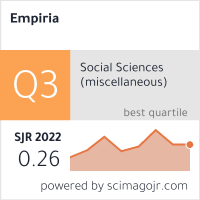The invisible work. Employment and social inclusion devices for immigrant women in Barcelona.
DOI:
https://doi.org/10.5944/empiria.33.2016.15862Keywords:
symbolic violence, immigrant women, unfitness, settlement support servicesAbstract
This paper aims to pay attention to the ways in which immigrant settlement societies deal with those who are considered as "other"; in this case, immigrant women. Specifically, our focus is on employment and social inclusion strategies targeted to facilitate these women’s social and work inclusion. Our exploratory field work has been carried out in two social resources which are aimed at work inclusion for immigrant women, both of them located in the Barcelona’s Raval district. The techniques used were participant observation and interview. Departing from the description of some examples of interactions established within such entities, we identify how immigrant women are required to do adjustments and / or changes in their behaviour in order to make a proper use of such resources and promote their social and employment insertion. These requirements are critically interpreted in the light of Bourdieu's concepts of habitus and symbolic violence or symbolic domination, reviewed by some critics. These concepts allow us to reflect on the different interactions that occur in these devices. Furthermore, they shed light on the complexity of immigrant women’s integration processes into society. The results of empirical research show that immigrant women are orientated to care and domestic work. Other examples confirm a kind of devaluation of the native language of immigrant women and of the visible manifestations of their religion. Even if it is possible to find other forms of interaction in social services; we argue the importance of recognizing these hierarchized forms of interaction in order to facilitate a critical perspective on disciplines involved in social intervention.
Downloads
Downloads
Published
How to Cite
Issue
Section
License
Los autores que publican en esta revista están de acuerdo con los siguientes términos:a) Los autores conservan los derechos de autor y garantizan a la revista el derecho de ser la primera publicación del trabajo al igual que licenciado bajo una Licencia Internacional Creative Commons CC BY-NC-SA 4.0.
b) Se permite y se anima a los autores a difundir electrónicamente las versiones pre-print (versión antes de ser evaluada) y/o post-print (versión evaluada y aceptada para su publicación) de sus obras antes de su publicación, ya que favorece su circulación y difusión más temprana y con ello un posible aumento en su citación y alcance entre la comunidad académica.










